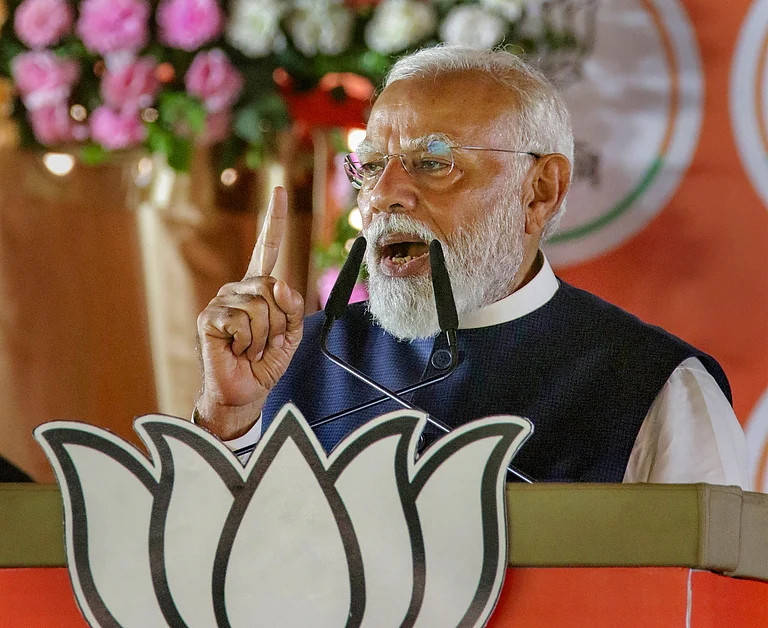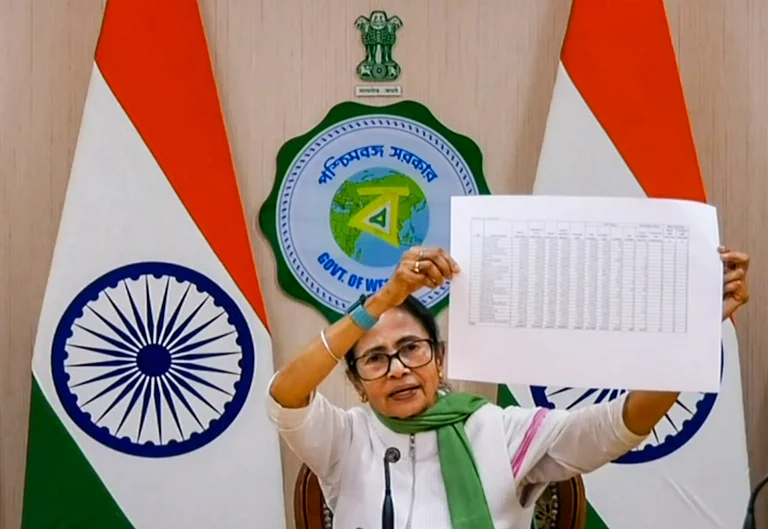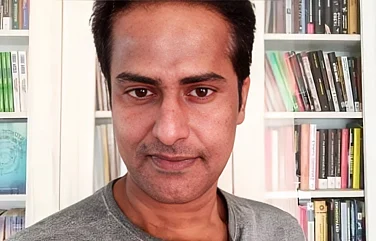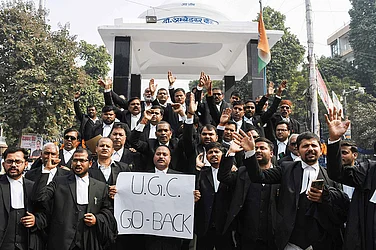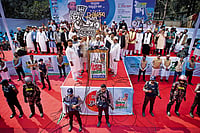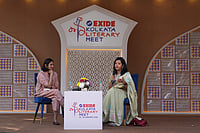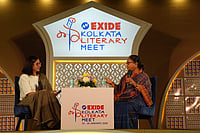The Bharatiya Janaya Party (BJP) is planning a series of ‘intellectual sessions’ in the small towns across the state over the coming months to create discussions around the restoration of Bengal’s cultural and economic heritage and the aspects of national security.
These events are being guided and supported by Syama Prasad Mookerjee Research Foundation (SPMRF), a New Delhi-based think-tank of the BJP, which will tie up with local organisations named after the likes of Netaji Subhas Chandra Bose, Swami Vivekananda and Syama Prasad Mookerjee and formed over the past few years.
According to BJP leaders, the SPMRF’s helmsman Anirban Ganguly, a member of the party’s central policy research wing, will be playing the anchoring role behind this campaign. A co-author of home minister Amit Shah’s biography, Ganguly has been active behind formulating the party’s Bengal strategy.
He will coordinate with Amitabha Chakraborty, the general secretary (organisation) of the BJP’s Bengal unit, for this civil society outreach programme.
“We’ll hold sessions in small towns in each of the state’s 294 Assembly constituencies. We will seek the local people’s opinion on how the state’s economic and cultural heritage can be restored. We’ll also share our ideas with them,” Ganguly said.
A Jadavpur University alumnus and a Bengali by ethnicity, Ganguly has been based in New Delhi. He is going to camp in the state till the 2021 Assembly elections.
During the Covid-19 lockdown, SPMRF conducted a series of video conferences with residents of small-town and prepared teams of volunteers who are approaching teachers, doctors and other successful professionals – those who have social influence in their own neighbourhood – for taking part in these discussions.
According to a senior BJP leader, Ganguly and Chakraborty will have a meeting later this month during which the logistics for such events would be discussed.
This initiative comes as a part of the BJP’s plan to connect with the state’s intelligentsia. Since the party has not yet managed to get support from the state’s prominent writers, artists and celebrities, they have set their focus on civil society persons in the small towns – school and college teachers, doctors, engineers, retired police and army men, among others.
“These people hold their influence in their respective neighbourhoods even if they are not widely known in the whole of a district or across the state,” said one of the organisers of the campaign.
Among the speakers who are going to travel different corners of the state to address such indoor sessions, to be held mostly in auditoriums, are well-known names and those not-so-well-known. Tathagata Roy, former governor of Tripura and Meghalaya, Swapan Dasgupta, Rajya Sabha MP and columnist, Mohit Ray, Bengal BJP’s refugee cell convenor and Rantidev Sengupta, the editor of the RSS’s Bengali mouthpiece, Swastika.
Other speakers include Arijit Bhattacharya, an assistant professor of political science at Burdwan University, Manoranjan Joddar, an assistant professor of history at Bangabasi College in Kolkata and Biswaranjan Misti, an associate professor of geography at Burdwan University.
During the 2019 Lok Sabha elections, the SPMRF helped organise 35 such events across the state. However, with the target of holding nearly 300 events this time, the magnitude of the campaign increases manifolds.
Among events already scheduled are one in the Bangladesh-bordering town of Bongaon in North 24-Parganas district and the other in Kalyani town in the neighbouring Nadia district on November 28.
The topic of the Bongaon event is “India’s national security, development of border regions and the security of West Bengal”. The subject of the Kalyani event is “The principles of the Indian Constitution and the present state of West Bengal.”
In Kalyani, the speakers are Ganguly, Mohit Ray and Alok Ghosh, an associate professor of history at Kalyani University. In Bongaon, too, some local personality will join Ganguly and Ray.
On November 29, they are organising a trip to Marichjhapi, a place in the Sundarbans controversially known for an alleged massacre of refugees during the Left regime in 1979. The SPMRF team will discuss with members from local Scheduled Caste and Scheduled Tribe communities while travelling to Marichjhapi’s neighbouring islands – Marichjhapi has no human habitation now – in a launch.
One of the themes of the whole campaign is to tell people how the Left did harm to the state and why they should not be allowed to stage a comeback.
By 'restoration of the state’s economic and cultural heritage', the BJP refers to Bengal’s nineteenth and early-twentieth-century scene, when Hindu nationalism was a dominant influence on society. They also refer to the fact that Bengal had the country’s highest GDP at the time of Independence but gradually slipped down over seven decades of the Congress, Left and the TMC rule.
Home minister Amit Shah has repeatedly sought from the people of the state one chance to restore ‘Shonar Bangla’, or golden Bengal.
Psephologist Biswanath Chakraborty, a professor of political science at Rabindra Bharati University in Kolkata, however, sounded sceptical about the success of such events.
“The BJP has already started holding such events under different banners but the feedback that I received from some of the participants is not good for the party. Participants alleged that the speakers talked about the history and geography of Bengal and India but did not touch upon the burning issues affecting the state’s teaching community. There is too much of ideology, past and future, and too little of practical problems of the present time, at these events,” Chakraborty said.
“Since the BJP’s civil society outreach programme largely depends on the school, college and university teachers, success will remain elusive unless they start addressing the practical problems faced by the teaching community,” he added.








